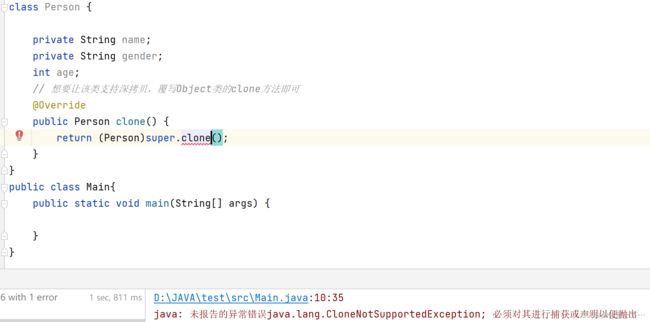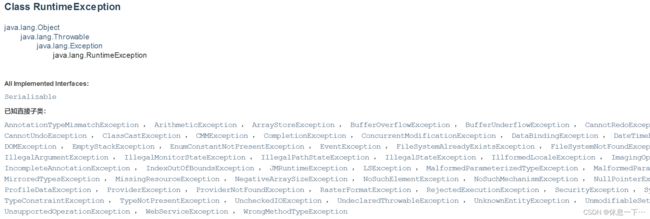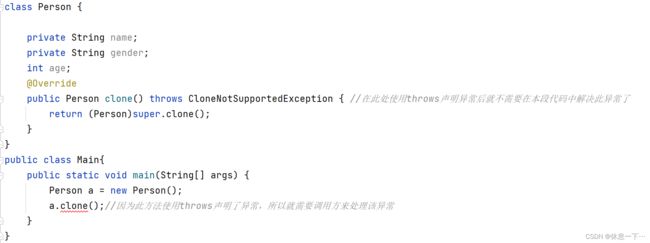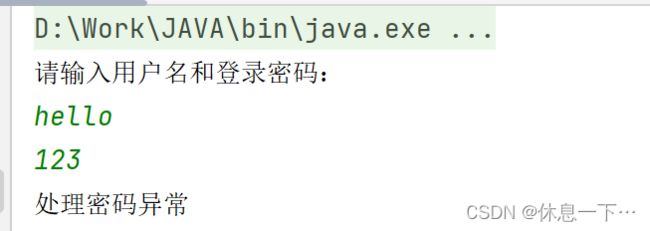JAVA中的异常
目录
Throwable
Error
Exception
编译时异常
运行时异常
异常的处理
try-catch捕获并处理
finally
throw
throws
自定义异常类
在Java中,将程序执行过程中发生的不正常行为称为异常。
而在JAVA中异常其实是一种类(Exception),JAVA中还有一种类(Error)它被叫做错误。
Throwable
Throwable:是异常体系的顶层类,Error 和 Exception 都是其派生出两个重要的子类。
Error
Exception
异常又可以分为:
- 编译时异常(受查异常)
- 运行时异常(非受查异常)
编译时异常
在程序编译期间发生的异常,称为编译时异常,也称为受检查异常(Checked Exception)。
运行一下代码报出的就是编译时异常。
class Person {
private String name;
private String gender;
int age;
// 想要让该类支持深拷贝,覆写Object类的clone方法即可
@Override
public Person clone() {
return (Person)super.clone();
}
}
public class Main{
public static void main(String[] args) {
}
}但是此时需要注意的是并不是代码下面标红就属于编译时异常
例如下面这个就属于语法错误而非异常:
运行时异常
在程序执行期间发生的异常,称为运行时异常,也称为非受检查异常(Unchecked Exception)
public static void main(String[] args) {
String a = "234";
System.out.println(a.charAt(9));
}在JAVA中RunTimeException以及其子类对应的异常,都称为运行时异常。
异常的处理
try-catch捕获并处理
在JAVA中会使用 try-catch 对异常进行处理。
语法规则:
try {
a// 将可能出现异常的代码放在这里
} catch (要捕获的异常类型 e) {
b// 如果try中的代码抛出异常了,此处catch捕获时异常类型与try中抛出的异常类型一致时,或者是try中抛出异常的基类时,就会被捕获到
// 对异常就可以正常处理,处理完成后,跳出try-catch结构,继续执行后序代码
} catch (要捕获的异常类型 h) {
c// 如果try中的代码抛出异常了,此处catch捕获时异常类型与try中抛出的异常类型一致时,或者是try中抛出异常的基类时,就会被捕获到
// 对异常就可以正常处理,处理完成后,跳出try-catch结构,继续执行后序代码
}将可能发生异常的代码放入 a 处,如果发生了 e 类型的异常就执行 b 处的代码,如果发生了 h 类型的异常就执行 c 处的代码。
public static void main(String[] args) {
try{
System.out.println(2/0);
System.out.println("hahah");//因为上一行发生了异常所以本行不会被执行;
}catch(NullPointerException a){
System.out.println("处理空指针异常");
}catch(ArithmeticException a){
System.out.println("处理算数异常");
}
System.out.println("lllllllll");
}
- try块内抛出异常位置之后的代码将不会被执行
- 如果抛出异常类型与catch时异常类型不匹配,即异常不会被成功捕获,也就不会被处理,继续往外抛,直到JVM收到后中断程序----异常是按照类型来捕获的。
finally
有些特定的代码,不论程序是否发生异常,都需要执行,比如程序中打开的资源:网络连接、数据库连接、IO流等,在程序正常或者异常退出时,必须要对资源进进行回收。另外,因为异常会引发程序的跳转,可能导致有些语句执行不到,finally就是用来解决这个问题的。
public static void main(String[] args) {
try{
System.out.println(2/0);
System.out.println("hahah");//因为上一行发生了异常所以本行不会被执行;
}catch(NullPointerException a){
System.out.println("处理空指针异常");
}catch(ArithmeticException a){
System.out.println("处理算数异常");
}finally{
System.out.println("一定会被执行的语句");
}
System.out.println("lllllllll");
}就算使用 return 提前退出方法,finally中的语句也会被执行:
public static void main(String[] args) {
try{
return;
}catch(NullPointerException a){
System.out.println("处理空指针异常");
}finally{
System.out.println("一定会被执行的语句");
}
System.out.println("lllllllll");
}throw
因为JAVA中的异常本质上是类,所以在JAVA中可以使用 throw 关键字来主动抛出异常。
public static void main(String[] args) {
System.out.println("前前前");
throw new NullPointerException("主动抛出的异常");
}
- throw必须写在方法体内部
- 抛出的对象必须是Exception 或者 Exception 的子类对象
- 如果抛出的是 RunTimeException 或者 RunTimeException 的子类,则可以不用处理,直接交给JVM来处理
- 如果抛出的是编译时异常,用户必须处理,否则无法通过编译
- 异常一旦抛出,其后的代码就不会执行
throws
当方法中抛出编译时异常,用户不想处理该异常,此时就可以借助throws将异常抛给方法的调用者来处理。即当前方法不处理异常,提醒方法的调用者处理异常。
语法格式:
修饰符 返回值类型 方法名(参数列表) throws 异常类型1,异常类型2...{
}
class Person {
private String name;
private String gender;
int age;
@Override
public Person clone() throws CloneNotSupportedException { //在此处使用throws声明异常后就不需要在本段代码中解决此异常了
return (Person)super.clone();
}
}
public class Main{
public static void main(String[] args) {
Person a = new Person();
a.clone();//因为此方法使用throws声明了异常,所以就需要调用方来处理该异常
}
}
- throws必须跟在方法的参数列表之后
- 声明的异常必须是 Exception 或者 Exception 的子类
- 方法内部如果抛出了多个异常,throws之后必须跟多个异常类型,之间用逗号隔开,如果抛出多个异常类型具有父子关系,直接声明父类即可。
- 调用声明抛出异常的方法时,调用者必须对该异常进行处理,或者继续使用throws抛出
自定义异常类
Java 中虽然已经内置了丰富的异常类, 但是并不能完全表示实际开发中所遇到的一些异常,此时就需要维护符合我们实际情况的异常结构。
因为JAVA中的异常都是继承于 Exception 类,所以我们的自定义异常类也需要继承于 Exception 类。
自定义的登录异常:
import java.util.Scanner;
class NameLogInException extends Exception{
public NameLogInException(String str){
super(str);
}
}
class PasswordLogInException extends Exception{
public PasswordLogInException(String str){
super(str);
}
}
public class Main{
public static void main(String[] args) {
Scanner in = new Scanner(System.in);
System.out.println("请输入用户名和登录密码:");
try{
logIn(in.nextLine(), in.nextLine());
}catch(NameLogInException a){
System.out.println("处理用户名异常");
}catch(PasswordLogInException a){
System.out.println("处理密码异常");
}
}
public static void logIn(String name, String password) throws NameLogInException, PasswordLogInException{
if (!name.equals("hello")) {
throw new NameLogInException("用户名异常");
}
if (!password.equals("123456")) {
throw new PasswordLogInException("密码异常");
}
}
}
- 自定义异常通常会继承自 Exception 或者 RuntimeException
- 继承自 Exception 的异常默认是受查异常
- 继承自 RuntimeException 的异常默认是非受查异常












